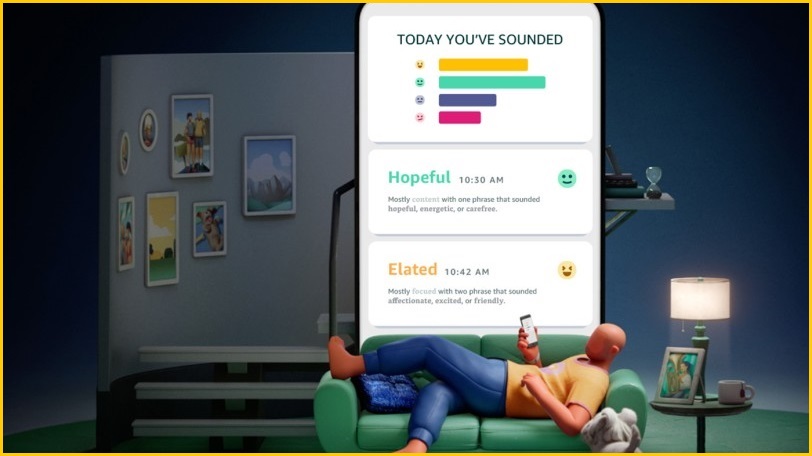Amazon’s new watch-style smart wristband knows how happy you are based on your speech.
'Tone' monitors your speech throughout the day, analysing it for ‘positivity’ and ‘energy’ as part of Amazon's health and wellbeing subscription service, Halo, which was announced last week.
Positivity is a measure of your happiness (or sadness) while energy is based on how excited or tired you sound.
Tone takes that analysis and gives you summaries to tell you how you’ve sounded throughout the day so you can modify your tone of voice.
Amazon Halo’s Principal Medical Officer, Dr Maulik Majmudar, said Tone has already helped him identify stress during COVID-19.
“I have been working from home with three kids under the age of four, so I use Tone to gut check that I am not taking any stress out on my family or friends,” Majmudar said.
“I check my Tone results so that I can be more intentional about how I communicate in these strange times – and have noticed it takes a burden off my wife, as she doesn’t have to be the one to tell me I am overly stressed.”
Tone listens to you through speakers on Amazon’s new Halo Band – the company’s smart watch-style wristband.
Halo Band contains all the usual health features (like step and sleep counters) and adds a suite of functions through a monthly Halo subscription service.
Introducing Amazon Halo, a new wearable band and membership that helps you improve your health and wellness. #AmazonHalo
— Amazon (@amazon) August 27, 2020
Request early access now ➡️ https://t.co/smPIrmXkEH pic.twitter.com/OvsFYGanHW
A Halo subscription gives its users access to Tone and other wellbeing focused features like Body which leverages machine learning to measure body fat percentage through your camera.
Band and Halo are currently only available for early access in the United States.
Privacy concerns
In its product announcements for Halo, Amazon addressed the expected privacy concerns.
User health data will be encrypted, Body scan images are deleted after the AI processes them, and Tone speech samples are only analysed locally, according to Amazon.
But former Chief Privacy Officer at the US National Coordinator for Health IT, Lucia Savage, warns that Amazon still sets its own standards when it comes to customer privacy.
“The privacy controls announced by Amazon for Halo are simply provisions in its Terms of Use,” she said in an opinion piece for CNBC.
“Companies like Amazon can change its terms prospectively at any time, so long as they do not mislead or treat consumers unfairly.
“That’s something that people in the privacy world, like myself, will keep an eye on.”
Amazon and its Silicon Valley rivals were caught out listening to users’ conversations through smart speakers last year.
Tech giants had paid staff to transcribe snippets of human speech in order to improve machine learning algorithms – without telling users their conversations with voice assistant devices could be heard by human ears.
Data for insurers
Personal data is not just valuable for Amazon, which already leverages customer data to power its recommendation algorithm; insurance companies have long been keen to get hold of high-fidelity health and exercise data provided by wearables like Fitbits.
Back in 2018, US insurer John Hancock added fitness trackers to all its insurance policies – rewarding customers who reach certain activity targets.
Now, Amazon has partnered with John Hancock to provide its Halo Band and three years of Halo membership to John Hancock insurance customers.
“This strategic endeavor allows us to offer our customers the latest in insights-driven personal health technology that can help them improve their overall wellness,” said John Hancock CEO, Brooks Tingle.
“We believe these enhancements will have a positive impact for our customers.”
While this type of program supposedly rewards insurance customers for staying healthy, research from the Queensland University of Technology last year found that Australian consumers were becoming worried about the negative effects of wearable-augmented insurance schemes.
"Participants expressed fear that wearing a fitness tracker would become compulsory, and non-users would be penalised with higher insurance rates,” the research paper said.










